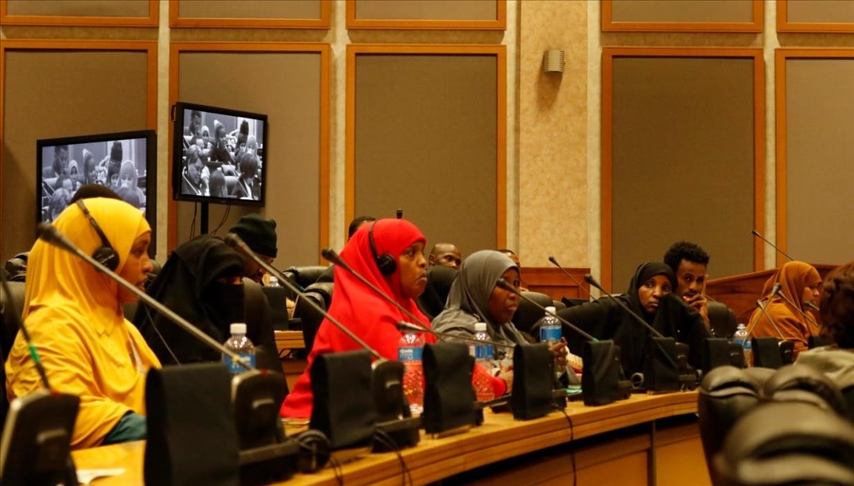‘Clan rivalry in Somalia hinders strategic partnerships with US’
Former Somali diplomat pleads Somalis to unite to seek substantial international support for benefit of the country
 Members of the Somali community in South Africa seen in this 2019 file photo address some of the issues affecting refugees and migrants at the Pan-African Parliament in midrand near Johannesburg(Photo Hassan Isilow)
Members of the Somali community in South Africa seen in this 2019 file photo address some of the issues affecting refugees and migrants at the Pan-African Parliament in midrand near Johannesburg(Photo Hassan Isilow)
JOHANNESBURG
As the US draws plans to send back its troops to Somalia, a former top government official said the move will pave the way for the exit of the African peacekeepers, who have become quite unpopular in the country, located in the Horn of Africa.
In an exclusive interview with Anadolu Agency, Abukar Arman, former special envoy to the US and a political analyst, said while the African Union Mission in Somalia operated by the African Union with the approval of the UN Security Council had done a great job in stabilizing the country, but locals were losing confidence in it.
He said Somalis perceive Kenya and Ethiopia as regional rivals, who have also contributed troops for the mission.
Arman, who focuses on foreign policy, Islam, the Horn of Africa, and extremism, said he was sure that the US troops will return to the region after a hurried pullout announced by former President Donald Trump.
“The Balledoogle camp where those troops were stationed was left intact, and African Union peacekeepers (AMISOM) and others are still keeping guard till the American troops return,” he said.
The US had stationed 650-800 soldiers in Somalia to support and mentor an elite Somali unit known as the Danab (lightning) Brigade to stabilize the country.
Arman said the US troops along with Turkish trained local troops will pave the way for the exit of African peacekeepers.
“Ever since they (Kenya and Ethiopia) joined the AMISOM, al-Shabaab, which was cleared from Mogadishu since 2011, made a comeback with vengeance. Among other violent operations, they attacked Villa Somalia, where both the Somali president and prime minister work and live and the parliament while in session,” he said.
Kenyan and Ethiopian move to support opposing sides in the 2019 presidential elections in the autonomous Somali region of Jubbaland also created tensions.
Describing the Somali government as weak and lacking a comprehensive strategic plan for sustainable security, Arman said this has given strength to al- Qaeda-linked Somali militant group al-Shabaab to extort money from businesses.
According to reports the terror outfit has managed to collect $120 million last year through extortion and parallel taxes.
Weak government
“Despite the political rhetoric, it is naive to think a government that cannot fully guard the Villa Somalia (presidential palace) or stops al-Shabaab from collecting extortion money from Bakaarah (largest market in capital Mogadishu) can curtail the latter’s activities elsewhere in the country,” he said.
The former diplomat said that the recent indiscriminate killing of civilians by AMISOM soldiers has also created a difficult situation with the civilians at some places up against them.
Arman who is also the founder of Baseerah Transformative Strategies -- a consultancy firm on ethical strategy and leadership – pleaded Somali people to unite to seek substantial international support for the benefit of their country.
He said the country needs genuine reconciliation, involving all stakeholders. He, however, doubted if the current government has the genuine interest to spearhead such an effort.
Efforts to get a comment from the government regarding their intention to hold such a process were futile as spokespeople were not willing to comment.
He said despite the US being the main donor, but there is no strategic partnership between the two countries.
“The de facto US policy of the last three administrations is deliberately designed to maintain a certain facade as in the war on terrorism,’’ said Arman.
Divided clans
Describing unity of stakeholders in Somalia as a challenge, former diplomat quoted a 2015 statement of current US Deputy Secretary of State, Wendy Sherman, saying that Somalis have to decide whether they want to exist as desperate clans isolated from the world and in conflict with one another or as a united country with all the attributes, benefits and responsibilities that such unity brings.
Agreeing with Sherman’s observations, Arman said Somalia is still divided along with clans which makes it difficult for strategic partnership.
“Their main objective is fast results or instant gratification, whereas strategic partnership requires a commitment from both countries that are economically, geopolitically, and militarily beneficial to both parties,” he said.
Regardless of the fact whether Somalis speak one language and the majority of them are Muslims, belonging to the same ethnic group, they are, still divided along with the clans.
This aspect has weakened successive Somali governments and has been responsible for previous civil wars, said the former diplomat.
Even elections in Somalia are centered around a clan-based model. In the indirect electoral system, representatives from various clans across the country choose members of parliament, who then choose a president.
Anadolu Agency website contains only a portion of the news stories offered to subscribers in the AA News Broadcasting System (HAS), and in summarized form. Please contact us for subscription options.







